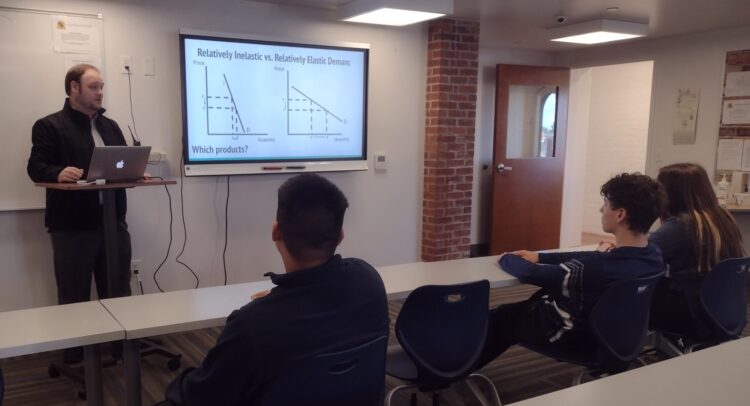By Caleb Turner
ROGERS, ARK. — Economics makes up everything around us. Almost anything that can be thought of costs something. Money influences our politics, our stores, our schools, and even our homes. Learning how these things are influenced by the economy can assist scholars in making better overall decisions in life. AP Macro and Microeconomics are classes that teach these concepts.
Aimee Bisbee signed up to take both courses for her junior year. She said, ”Well, I feel like economics is something that a lot of people don’t understand but plays such a vital role in our society.”
The classes help form critical thinking skills when faced with problems involving the economy. The knowledge scholars will gain will help them estimate prices, predict politics, or even buy a house.
When asked about the difference between the two classes, teacher Stacy Hughes stated, “Where micro is more looking at individual behaviors of business and households, macroeconomics is looking at larger concepts and ideas of what the business cycle is, what overall trends are happening in the financial sector. If the government steps in and makes policies, what are the long run implications of those policies.”
Regarding the difficulty of the class, Bisbee stated,” It really depends on the person, So i would say a seven because I’m not good at math, but someone who has a background in math probably a five or a six.”.
AP Microeconomics and Macroeconomics creates a good foundation of knowledge for classes scholars will go on to take in college. Also, colleges might be more inclined to accept scholars for a related major if they have taken the class.
According to Hughes,”In microeconomics Unit 1 is basic economic concepts, Unit 2 is supply and demand, Unit 3 is production, cost, and perfect competition, Unit 4 is imperfect competition, Unit 5 is factor markets, Unit 6 is market failure and the role of government.” The Units for macroeconomics are basic economic concepts, economic indicators and the business cycle, national income and price determination, financial sector, long-run consequences of stabilization policies, and open economy/international trade and finance
Bisbee recommended the class, saying, ”I would suggest taking AP micro and AP macro. It’s also good on college applications because they are the least offered AP classes.”
In today’s world, it is essential to understand the economy. AP Micro/Macroeconomics provides an understanding of the economy that will assist students throughout their whole lives.

